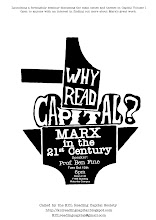Nicholas Beech, a PhD student from University College London, and Ken Kobayashi of the Reading Capital group will introduce a discussion on:
‘Machinery and Modern Industry'.
Tuesday May 11th
6pm
F-WB 2.80 Waterloo Campus KCL
"John Stuart Mill says in his “Principles of Political Economy":
“It is questionable if all the mechanical inventions yet made have lightened the day’s toil of any human being.”
That is, however, by no means the aim of the capitalistic application of machinery. Like every other increase in the productiveness of labour, machinery is intended to cheapen commodities, and, by shortening that portion of the working-day, in which the labourer works for himself, to lengthen the other portion that he gives, without an equivalent, to the capitalist. In short, it is a means for producing surplus-value.
In manufacture, the revolution in the mode of production begins with the labour-power, in modern industry it begins with the instruments of labour. Our first inquiry then is, how the instruments of labour are converted from tools into machines, or what is the difference between a machine and the implements of a handicraft? We are only concerned here with striking and general characteristics; for epochs in the history of society are no more separated from each other by hard and fast lines of demarcation, than are geological epochs."
N.B. We will be reading chapter 15 for this session.
